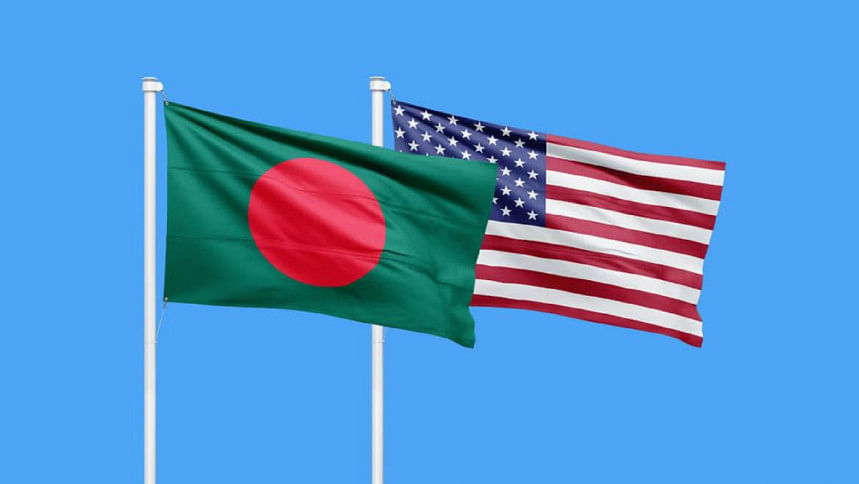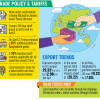Bangladesh to push for tariff cuts in USTR talks in Washington today

The whole world has been waiting to see the final decision on the reciprocal tariff rate of the Trump administration as the 90-day pause deadline is coming to an end on July 8.
Every country is trying to reach a tariff agreement to secure lower duty and to secure their share in the American market.
Although the countries concerned have been negotiating intensely with the United States Trade Representative (USTR) to reach agreements to secure lower tariff rates in the US market, so far only the UK has been able to reach an agreement with the Trump administration on tariff rates, although Trump announced that he would sign 90 agreements during the three-month pause.
Many countries such as India are in the final stage of the agreements, but analysts cast doubt on whether these agreements can be finally signed or not, as there are a lot of conditions.
Meanwhile, worries over future US tariffs are clouding the outlook for factories across much of the United States, Asia and Europe, according to surveys released on Tuesday, which nonetheless showed some were able to shrug off the uncertainty and keep growing, according to Reuters.
Bangladesh has also been engaged in negotiations to sign a tariff agreement with the US. The meeting between Bangladesh and the USTR is scheduled to be held today in Washington DC in American standard time.
The main focus of the meeting is to sign an agreement on the final rate of reciprocal tariff on Bangladesh, as the Trump administration imposed the rate at 37 percent, which is an additional percentage over the previous 16 percent, making the total 53 percent.
Commerce Adviser Sk Bashir Uddin has flown to Washington to attend the meeting with the USTR.
Bashir Uddin will join National Security Adviser Khalilur Rahman, who is already in Washington for negotiations.
In the stalemate situation of the negotiation, the Trump administration may extend the 90-day tariff pause for another three months to facilitate the negotiation, as many countries could not reach consensus on the draft tariff agreement, said a businessman who is familiar with the draft document and negotiation.
The US has given some tough conditions to Bangladesh, which are very much related to the tariff, para-tariff and national interests, which need to be further studied before reaching a final agreement, the businessman said, asking not to be named.
However, a working plan is underway to address the conditions given by the Trump administration, he also said.
It may take more time to reach the final agreement, as both sides are engaged in dialogue, he also said.
Both Bangladesh and the US have signed a Non-Disclosure Agreement (NDA), and this is why no information can be shared.
"I do not know whether the 90-day pause has been extended for another 90 days or not," Bashir Uddin said over the phone Tuesday.
However, the US is the single largest export destination for Bangladesh and interdependence is higher between the two countries, he added.
On Monday, Bangladesh gave its opinion on the third draft of the US reciprocal tariff agreement, as both countries need to discuss further some key issues, said Commerce Secretary Mahbubur Rahman.
The secretary said the negotiation will continue with the US to reach consensus through discussions between the two countries.
Sources familiar with the negotiation said reaching the final agreement may take more time as the US does not agree on some key issues.
For instance, Bangladesh wants to follow the multilateral trading formula of the World Trade Organisation (WTO) to sign the draft tariff agreement, but the US wants a bilateral tariff cut on the import of American goods.
The MFN rate means once a tariff is reduced for a country, the same rate of tariff will also be applicable for other countries.
For example, if the tariff is lowered or made zero on import of US cotton in Bangladesh, the same zero rate will have to be applied also for other countries such as China, which America may not like, because of trade tension between the US and China.
Earlier, the USTR sent the first draft of the tariff agreement to Bangladesh on June 14, and the country has already given its opinion on the draft tariff agreement twice, and still the countries could not reach consensus.
US total goods trade with Bangladesh was an estimated $10.6 billion in 2024, according to data from the USTR.
US goods exports to Bangladesh in 2024 were $2.2 billion, down 1.5 percent ($34.0 million) from 2023.
US goods imports from Bangladesh totalled $8.4 billion in 2024, up 1.1 percent ($89.3 million) from 2023.
The US goods trade deficit with Bangladesh was $6.2 billion in 2024, a 2 percent increase ($123.2 million) over 2023.
Bangladesh has made "good progress" in consultations with US officials, with both sides working "seriously" to finalise a reciprocal tariff agreement swiftly, according to a statement from the Chief Adviser's Office last week.
The government has already submitted its comments on the draft deal ahead of a high-level meeting between Bangladesh and the US Trade Representative, scheduled for July 3 in Washington.
The 90-day pause on the tariff, announced by the Trump administration in April this year, is set to expire on July 8.
"We made very good progress during our consultations with the US team. Both sides are making serious efforts to finalise the agreement expeditiously," said Khalilur Rahman, a former trade policy chief at the UN Conference on Trade and Development (UNCTAD), according to the statement from the CA office last week.
Officials familiar with the negotiations said Bangladesh is seeking to maintain the existing 16 percent tariff along with the 10 percent baseline duty introduced in April this year, bringing the total to 26 percent.
This position is being framed as a counterproposal to the proposed 37 percent reciprocal tariff on Bangladeshi exports.
Dhaka is also expected to request an extension of the current pause on the tariff's implementation by a further three months.
Separately, the Bangladesh Garment Manufacturers and Exporters Association (BGMEA) proposed a 10 percent tariff and a three-month extension during a meeting with Tracey Ann Jacobson, the chargé d'affaires at the US Embassy in Dhaka, on June 24.
A businessman who attended that meeting said the 10 percent baseline tariff could remain in effect during the extended pause.
He added that if Washington insists on a reciprocal tariff, Bangladesh would prefer it to be capped at 10 percent instead of the proposed 37 percent, given that the country already faces a 16 percent duty on its exports to the US.
If the full 37 percent tariff is implemented, the total duty on Bangladeshi goods could rise to 52 percent.
At present, Bangladeshi exporters face a 26 percent tariff on shipments to the US, following the imposition of the additional 10 percent baseline duty on April 8.
Earlier, Chief Adviser Professor Muhammad Yunus in a letter to President Donald J. Trump requested negotiations to reconsider reciprocal tariffs for Bangladesh.
"We are also the first country to enter into a multi-year agreement to import liquefied natural gas (LNG) from the US and have been exploring further collaboration since you lifted the freeze on the LNG export permit," Professor Yunus wrote in the letter.
"A key focus of our action is to significantly increase our imports of US farm products including cotton, wheat, corn and soybean, which will contribute to the income and livelihood of US farmers. To increase speed to market of US cotton, we are finalising a dedicated bonded warehousing facility in Bangladesh where they will have duty-free access," the letter also said.
"You will also be happy to know that Bangladesh has the lowest tariff on most US exports in the South Asian region. We continue to commit to zero tariff on the above American agricultural commodities, as well as on scrap metals. We are working on a 50 percent reduction of tariff on top US export items such as gas turbines, semiconductors and medical equipment," Yunus also said in the letter.
"We are also removing an array of non-tariff barriers to US exports. We are eliminating certain testing requirements, rationalising packaging, labelling and certification requirements, and undertaking trade facilitation measures such as simplifying customs procedures and standards.
We have executed the necessary steps to launch Starlink in Bangladesh," he added.
Also, Bashir Uddin sent a similar letter to USTR Ambassador Jamieson Greer in April offering tariff reduction on imports of US goods in Bangladesh, aiming to reduce the trade gap between the two countries.
The trade gap between Bangladesh and the US is more than $6 billion, as Bangladesh exports goods worth $8 billion and imports goods worth $2 billion annually.

 For all latest news, follow The Daily Star's Google News channel.
For all latest news, follow The Daily Star's Google News channel. 






Comments